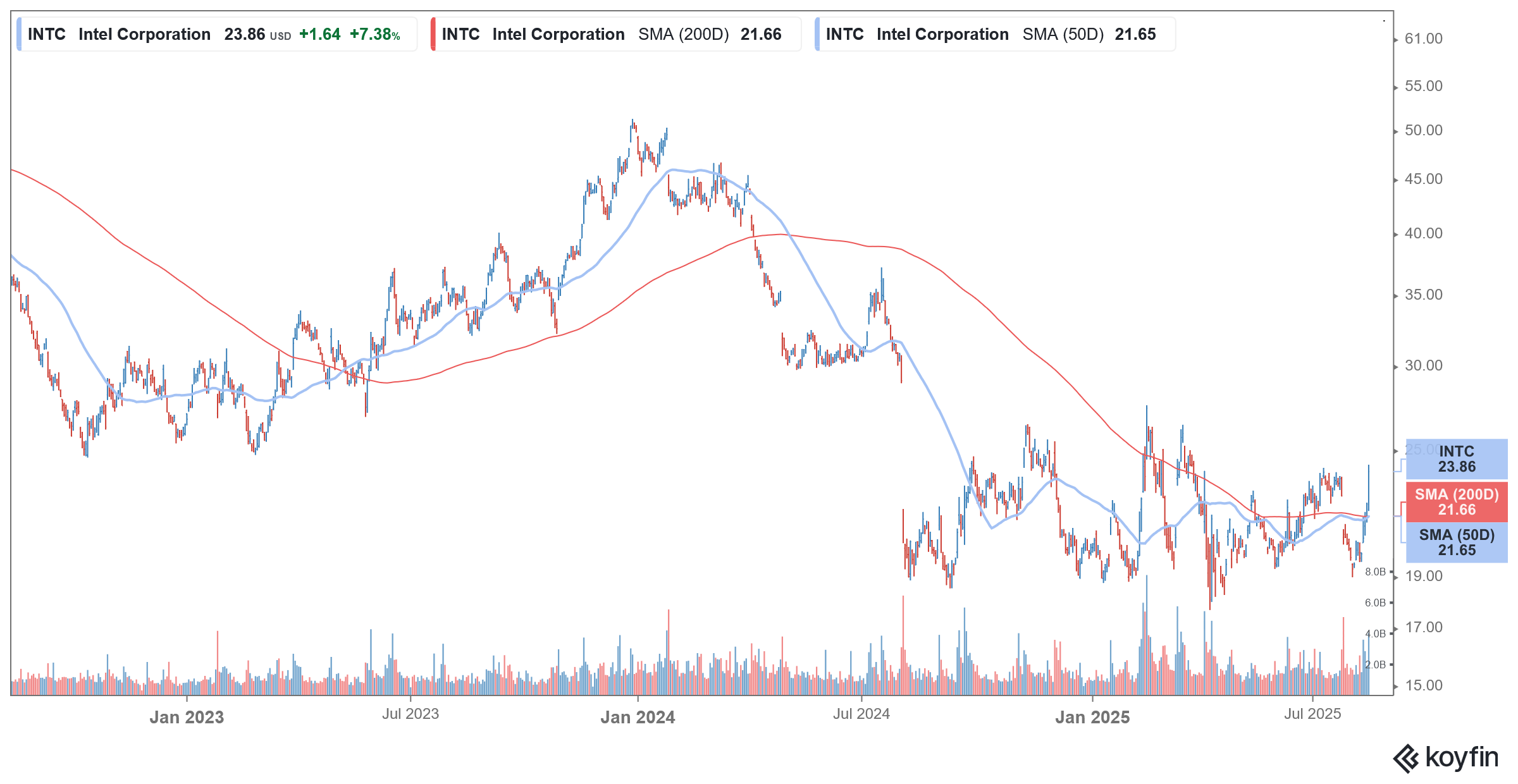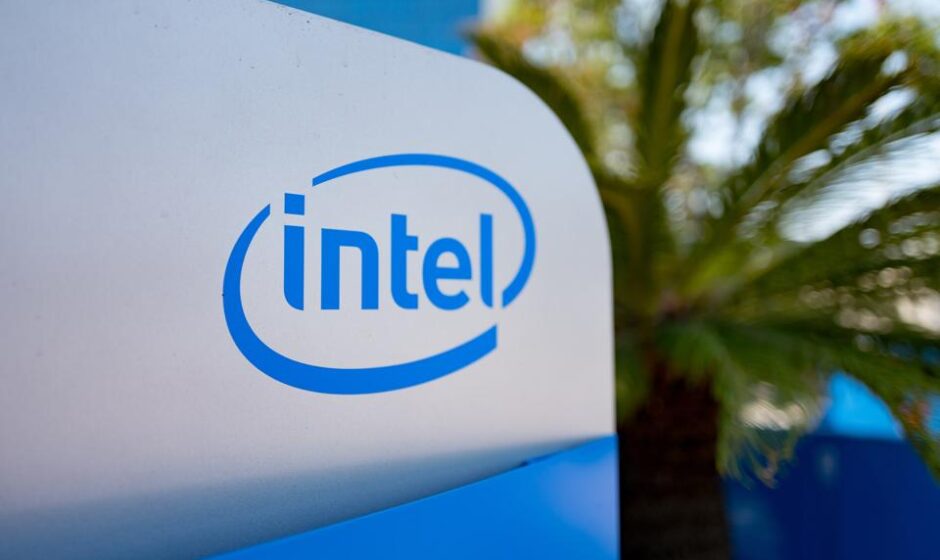Please note that we are not authorised to provide any investment advice. The content on this page is for information purposes only.
Intel stock closed over 7% higher yesterday and is up in US premarket price action today amid reports that the government is in talks to acquire a direct equity stake in the company.
This potential investment comes at a critical time for both Intel and the US in the global tech race, particularly concerning competition with China. The talks, which have been rumored to be in the early stages, follow a high-profile meeting between President Donald Trump and Intel’s CEO, Lip-Bu Tan, and are aimed at accelerating the construction of Intel’s massive, delayed manufacturing complex in Ohio.
Intel Stock Rises on Reports that the US Government is in Talks for a Stake
This discussion is a notable evolution of the government’s efforts to bolster the domestic semiconductor supply chain, which is considered a matter of national and economic security. While the US has already committed billions in grants and loans to companies like Intel through the CHIPS and Science Act of 2022, a direct equity stake would give the government a more hands-on role in the company’s strategic decisions.
Intel has already secured up to $7.86 billion in direct funding and an additional $3 billion for a separate project from the CHIPS Act. However, its planned $28 billion Ohio fabrication plants have faced delays, with the completion date pushed back to the 2030s. A government stake could provide the necessary capital and political backing to accelerate this project
For Intel, which has been facing financial challenges and technological setbacks, this infusion of cash would be a significant lifeline. It would help shore up its balance sheet as it invests heavily in new production capacity and strives to regain its leadership in advanced chip manufacturing from competitors like TSMC and Samsung.
The US Government Usually Does Not Invest in Private Companies
To be sure, it is quite unusual for the US government to bail out, let alone take stakes in private companies. The last time the country did so was during the 2008-2009 Global Financial Crisis, when it took stakes in General Motors and AIG. However, President Trump hasn’t really acted in the conventional way when it comes to economic as well as foreign policy.
Recently, the US government, through the Department of Defense (DoD), has taken a significant equity stake in MP Materials, the operator of the only active rare earth mine in the US. This partnership, which makes the DoD the largest shareholder, is a landmark move to secure a domestic supply chain for critical rare earth minerals, which are essential for national security and advanced technologies. The investment came at a time when China flexed its muscles by restricting exports of rare earths amid the trade tensions with the US.
The US Department of Defense Took a Stake in MP Materials
China’s export restriction sent alarm bells ringing in the US as these rare earths are crucial for a wide range of modern technologies, from smartphones and electric vehicles to fighter jets, drones, and missile guidance systems. The global market for these minerals has been dominated by China, which controls most of the world’s processing and refining capabilities. This concentration of the supply chain has long been a concern for the US, as it creates a significant vulnerability to potential geopolitical disruptions and market manipulation.
The same holds true for semiconductors as the US relies on imports, particularly from Taiwan, which is home to TSMC, the world’s biggest foundry that counts Apple and Nvidia as its customers. Previously, there were reports that Trump was pushing TSMC to take a stake in Intel as a condition for a trade deal with Taiwan.


Intel Is a Critical Piece of US Manufacturing
Intel is far more than just a chipmaker; it’s a critical component of US manufacturing, economic strength, and national security. As the only leading-edge semiconductor company in the US that both designs and manufactures its own chips, Intel plays an irreplaceable role in the domestic technology ecosystem. This position has become even more vital as the US seeks to re-shore critical manufacturing and reduce its reliance on foreign supply chains.
The ability to manufacture advanced semiconductors domestically is a strategic imperative for the US. Chips are the essential building blocks for virtually all modern technology, from personal computers and smartphones to military hardware and artificial intelligence systems.
Intel is a crucial piece for US manufacturing, especially as demand for AI chips skyrockets amid the artificial intelligence (AI) pivot.
Relations Between President Trump and Intel Have Been Nuanced
Relations between Trump and Intel have been quite nuanced. Last week, Trump publicly called for the immediate resignation of Tan. The demand was posted on the President’s social media platform Truth Social, where he stated that Tan is “highly CONFLICTED” and that there is “no other solution to this problem.”
However, after meeting Tan earlier this week, Trump was all praise for the Intel CEO. In his post on Truth Social, Trump said, “The meeting was a very interesting one. His success and rise is an amazing story. Mr. Tan and my Cabinet members are going to spend time together, and bring suggestions to me during the next week.”
Can Intel Turnaround with the US Government’s Support?
Intel, which was once the world’s biggest chipmaker, is now a pale shadow of its glorious past.
A lot went wrong with Intel over the last two decades. It made the strategic blunder of turning down the offer to supply processors for the Apple iPhone. The company believed that Apple might not be able to sell enough of these, and it was a tiny market to bet on.
Intel was relatively slow with innovation, and AMD gradually gained market share in the PC market. Apple, too, stopped using Intel chips for its Mac and instead pivoted to its own chips.
Intel was pivoting to the foundry model and hoped to make chips for other chip designers. However, despite burning billions of dollars on that business, Intel hasn’t been able to secure enough clients for its foundries.
Despite being the biggest beneficiary of the CHIPS Act, Intel has not yet been able to turn the corner, even as the turnaround remains a work in progress. While Intel stock has seen some upward momentum in recent days, it trades at a fraction of its all-time highs, even as Nvidia has become a 4 trillion dollar behemoth riding the AI euphoria.
#Intel #Stock #Rises #Reports #Government #Stake


